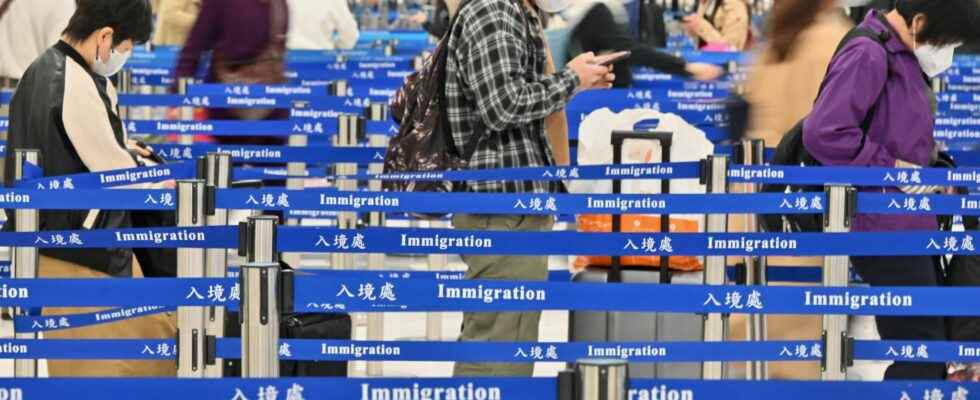Lee Chu-qiao, 55, got up early to make sure she found what she was looking for at a pharmacy in Hong Kong’s Sheung Shui district. But in one of its colorful streets, under red neon lights, a queue has already formed in front of the store. The place has been welcoming a growing number of customers since the reopening, on Sunday January 8, of the border between the “special administrative region” and mainland China.
Lee bought five bottles of a Chinese anti-diarrhea drug, reputed to be effective against the symptoms of new variants of Covid-19, and whose price almost tripled in a few weeks, to reach 70 HK$ (8.5 euros). “My family asked me to buy medicine in Hong Kong because they can no longer get it in China, explains Lee. I will bring it to them as soon as I cross the border.”
According to a pharmacy employee, people are snapping up this kind of medicine without a prescription: “All our stock of anti-diarrhea and anti-vomiting was sold after January 1, specifies the pharmacist. waited three days to be replenished, and everything is already sold out after half a day.”
With a government that has come completely under Beijing’s control since the imposition of the 2020 national security law, many locals fear that their interests – and their health – will come after those of mainland Chinese. The reopening of the borders “will completely tip Hong Kong into the disaster unfolding in China,” said Cheung, questioned in front of the pharmacy.
Pressure on caregivers
The authorities are trying to allay fears by stressing that the export of pharmaceutical products is subject to strict rules. “Everything is under the control of the Health Department, which issues strict import and export permits for drugs,” Ida Ng, a customs official, told the local newspaper. Standard.
It remains to define the acceptable threshold. John Lee, chief executive of Hong Kong, announced that 60,000 people will be allowed to cross the border daily, in one direction or the other.
Gabriel Choi, former president of the Hong Kong Medical Council, believes that the sale of drugs to the Chinese – which could reach huge volumes – will be to the detriment of the health of Hong Kongers. For this expert, the opening of the borders will also intensify the pressure on local caregivers, already exhausted after the deadly wave of Covid which affected the territory last year. Despite the obligation to provide a PCR test at the border, he anticipates a new outbreak of contamination. Mainland Chinese “will be able to buy medicine and get vaccinated, and when Hong Kongers finally need doses against the new wave of Covid, they will no longer be able to access them, worries Gabriel Choi. For the moment, it’s the chaos in mainland China, and they are trying to transfer some of that pressure to Hong Kong.”
According to this specialist, the forthcoming arrival of the Chinese also represents a business opportunity for private establishments. “Hong Kong has enough vaccines [NDLR : Pfizer-BioNTech, non disponibles en Chine] for its 7.5 million inhabitants, but the government has sold a lot of them to private hospitals, which can be accessed by wealthy tourists,” he predicts.
Good economic news
On the economic level, the arrival of the Chinese could help restart the Hong Kong economy, hard hit by the epidemic. Before the borders closed three years ago, between 200,000 and 300,000 Chinese traveled to Hong Kong every day. In 2017, they represented 76% of tourists in the megalopolis. A 2018 study showed that a Chinese staying only one day in Hong Kong spent 292 euros, three times more than a non-Chinese tourist, particularly in the luxury sector and high-end catering.
“The arrival of the Chinese will change everything, rejoices Kevin Lam, a restaurant owner in the Central district. The last three years have been terrible. Now we have to find enough people to rehire.” Optimistic, Iris Pang, economist at the financial institution ING, calculates that Hong Kong’s GDP could rebound by at least 5% this year (after having fallen by 4.5% in the third quarter of 2022), thanks to the dynamism of the tourism sector. , airlines and consumption.
The territory really needs this breath of fresh air. 2022 was marked by the departure of more than 113,000 locals and expatriates, the closure of many businesses, and a further decline in the stock market, which has plunged since 2020. In October 2022, Hong Kong real estate fell lowest since 2017.
While its competitiveness has been severely affected, Hong Kong could nevertheless struggle to quickly regain its luster. “Many countries, like Japan, have started to limit the flow of tourists from mainland China, warns economist Simon Lee, in the South China Morning Post. Investors could be just as cautious, and wait before putting their money in Hong Kong.”
